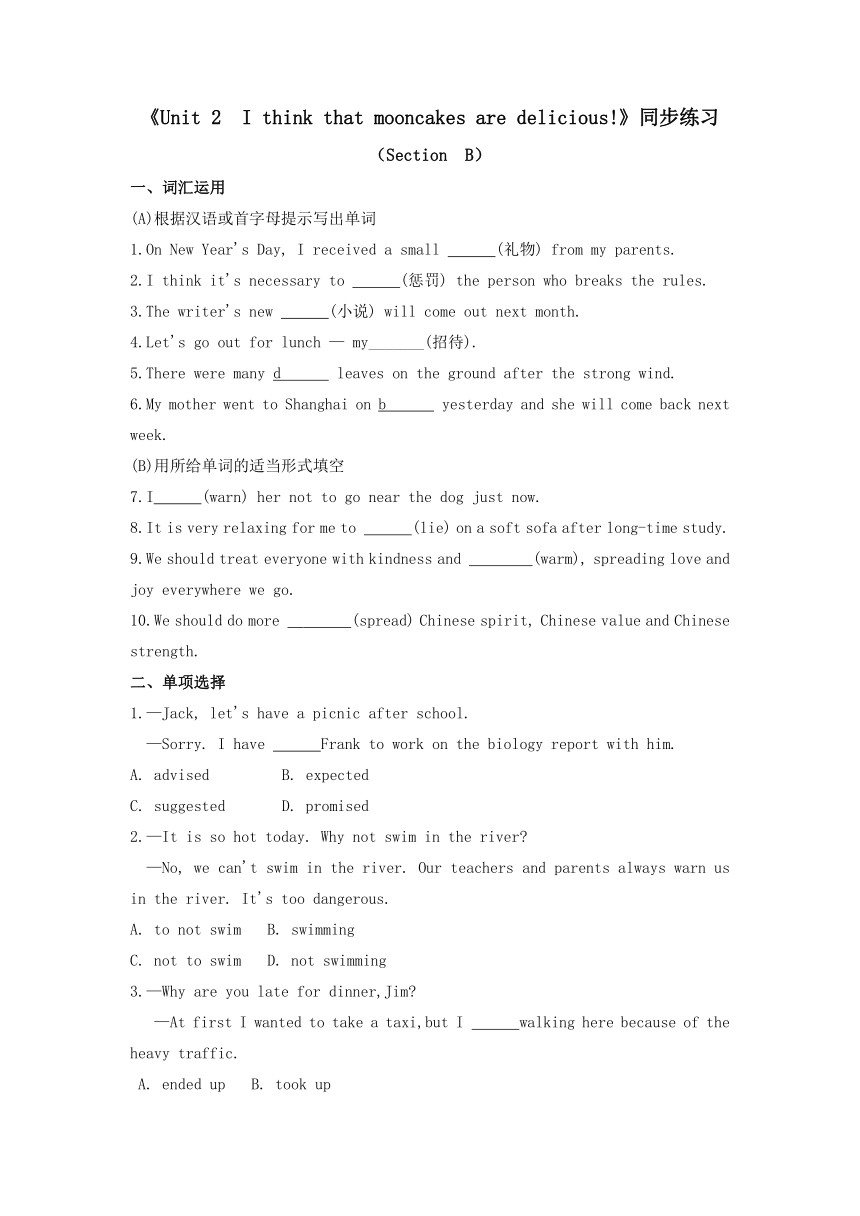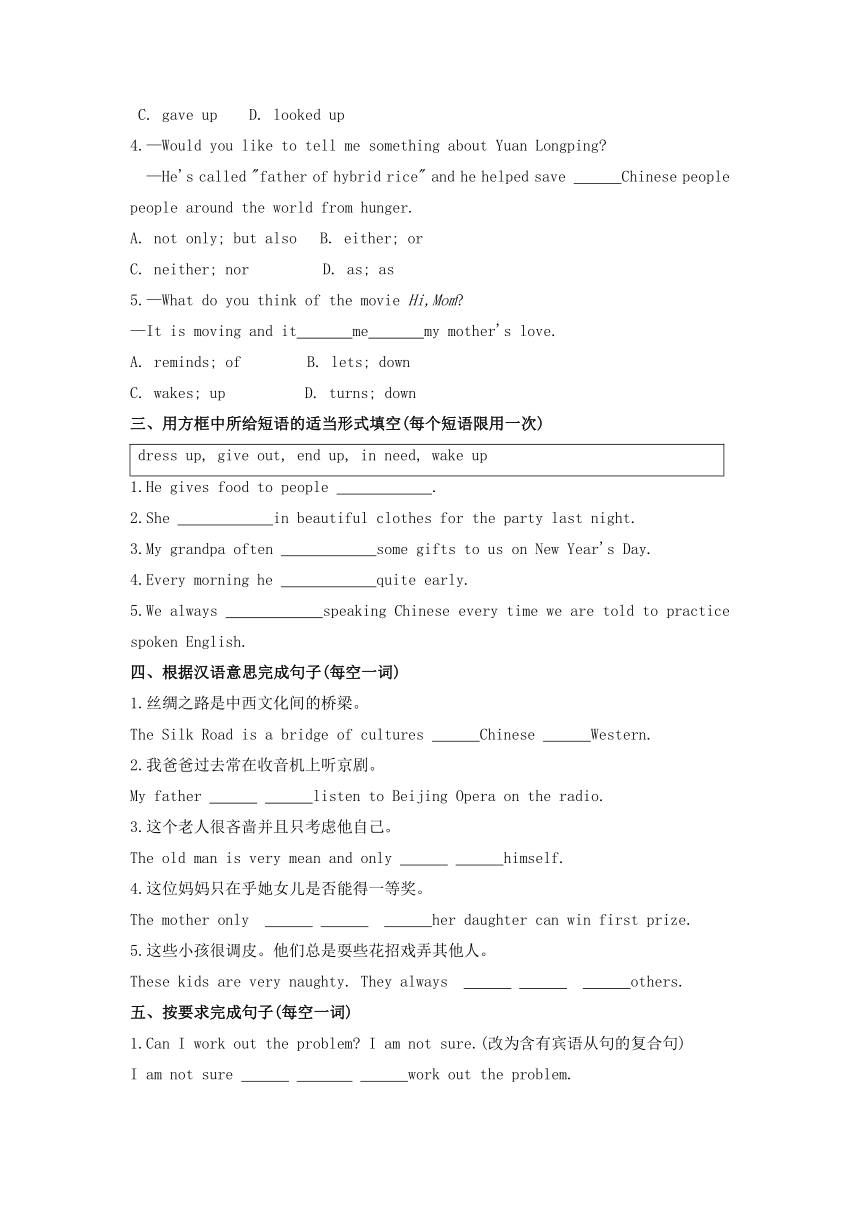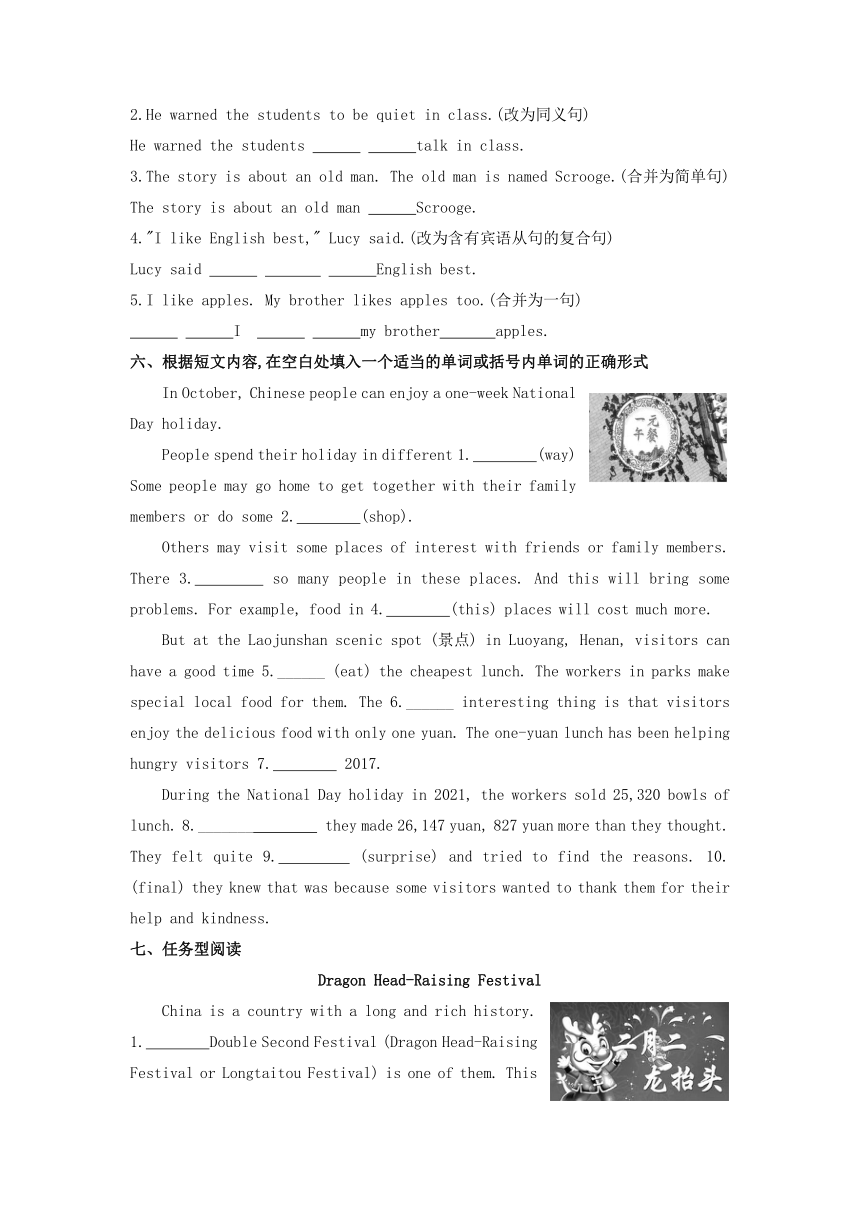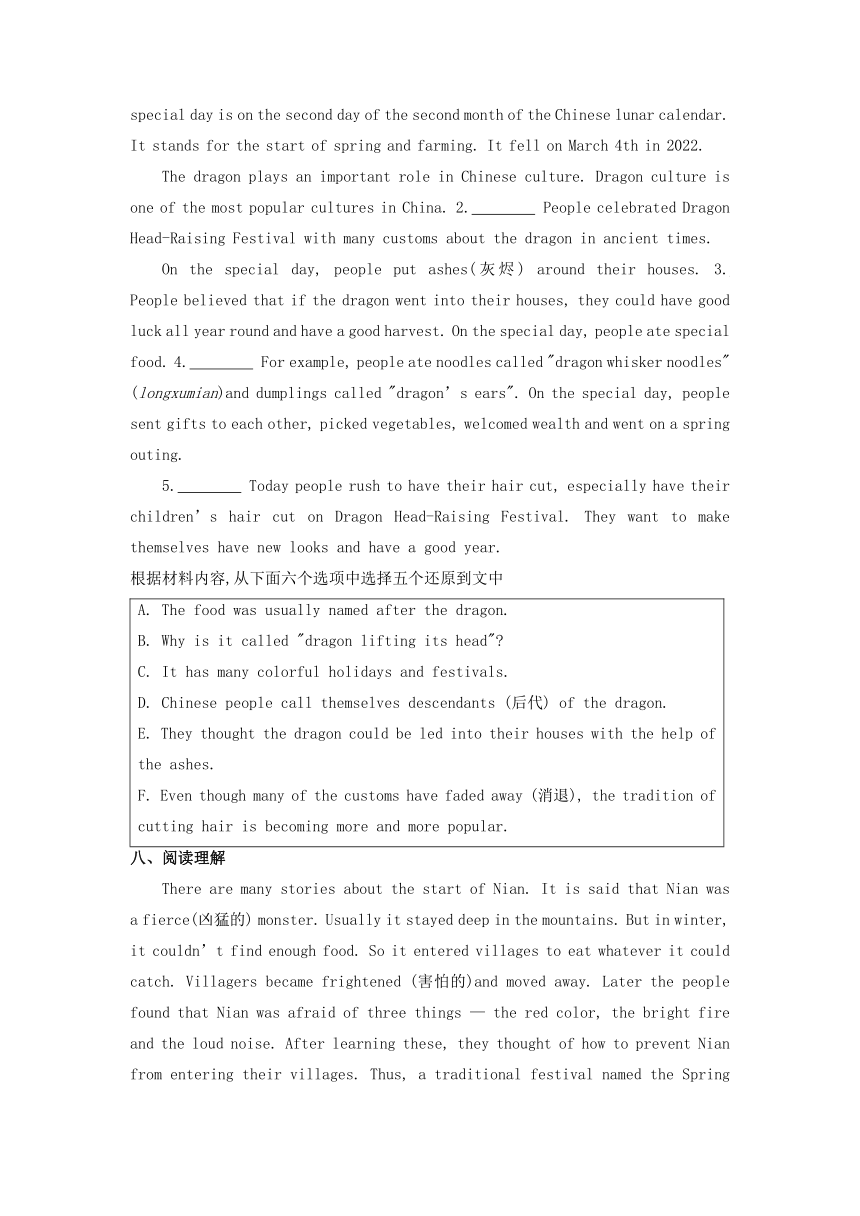Unit 2 I think that mooncakes are delicious! Section B同步练习(含答案)
文档属性
| 名称 | Unit 2 I think that mooncakes are delicious! Section B同步练习(含答案) |  | |
| 格式 | docx | ||
| 文件大小 | 106.8KB | ||
| 资源类型 | 教案 | ||
| 版本资源 | 人教新目标(Go for it)版 | ||
| 科目 | 英语 | ||
| 更新时间 | 2023-01-15 16:43:37 | ||
图片预览




文档简介
《Unit 2 I think that mooncakes are delicious!》同步练习
(Section B)
一、词汇运用
(A)根据汉语或首字母提示写出单词
1.On New Year's Day, I received a small (礼物) from my parents.
2.I think it's necessary to (惩罚) the person who breaks the rules.
3.The writer's new (小说) will come out next month.
4.Let's go out for lunch — my_______(招待).
5.There were many d leaves on the ground after the strong wind.
6.My mother went to Shanghai on b yesterday and she will come back next week.
(B)用所给单词的适当形式填空
7.I (warn) her not to go near the dog just now.
8.It is very relaxing for me to (lie) on a soft sofa after long-time study.
9.We should treat everyone with kindness and (warm), spreading love and joy everywhere we go.
10.We should do more (spread) Chinese spirit, Chinese value and Chinese strength.
二、单项选择
1.—Jack, let's have a picnic after school.
—Sorry. I have Frank to work on the biology report with him.
A. advised B. expected
C. suggested D. promised
2.—It is so hot today. Why not swim in the river
—No, we can't swim in the river. Our teachers and parents always warn us in the river. It's too dangerous.
A. to not swim B. swimming
C. not to swim D. not swimming
3.—Why are you late for dinner,Jim
—At first I wanted to take a taxi,but I walking here because of the heavy traffic.
A. ended up B. took up
C. gave up D. looked up
4.—Would you like to tell me something about Yuan Longping
—He's called "father of hybrid rice" and he helped save Chinese people people around the world from hunger.
A. not only; but also B. either; or
C. neither; nor D. as; as
5.—What do you think of the movie Hi,Mom
—It is moving and it me my mother's love.
A. reminds; of B. lets; down
C. wakes; up D. turns; down
三、用方框中所给短语的适当形式填空(每个短语限用一次)
dress up, give out, end up, in need, wake up
1.He gives food to people .
2.She in beautiful clothes for the party last night.
3.My grandpa often some gifts to us on New Year's Day.
4.Every morning he quite early.
5.We always speaking Chinese every time we are told to practice spoken English.
四、根据汉语意思完成句子(每空一词)
1.丝绸之路是中西文化间的桥梁。
The Silk Road is a bridge of cultures Chinese Western.
2.我爸爸过去常在收音机上听京剧。
My father listen to Beijing Opera on the radio.
3.这个老人很吝啬并且只考虑他自己。
The old man is very mean and only himself.
4.这位妈妈只在乎她女儿是否能得一等奖。
The mother only her daughter can win first prize.
5.这些小孩很调皮。他们总是耍些花招戏弄其他人。
These kids are very naughty. They always others.
五、按要求完成句子(每空一词)
1.Can I work out the problem I am not sure.(改为含有宾语从句的复合句)
I am not sure work out the problem.
2.He warned the students to be quiet in class.(改为同义句)
He warned the students talk in class.
3.The story is about an old man. The old man is named Scrooge.(合并为简单句)
The story is about an old man Scrooge.
4."I like English best," Lucy said.(改为含有宾语从句的复合句)
Lucy said English best.
5.I like apples. My brother likes apples too.(合并为一句)
I my brother apples.
六、根据短文内容,在空白处填入一个适当的单词或括号内单词的正确形式
In October, Chinese people can enjoy a one-week National Day holiday.
People spend their holiday in different 1. (way). Some people may go home to get together with their family members or do some 2. (shop).
Others may visit some places of interest with friends or family members. There 3. so many people in these places. And this will bring some problems. For example, food in 4. (this) places will cost much more.
But at the Laojunshan scenic spot (景点) in Luoyang, Henan, visitors can have a good time 5.______ (eat) the cheapest lunch. The workers in parks make special local food for them. The 6.______ interesting thing is that visitors enjoy the delicious food with only one yuan. The one-yuan lunch has been helping hungry visitors 7. 2017.
During the National Day holiday in 2021, the workers sold 25,320 bowls of lunch. 8._______ they made 26,147 yuan, 827 yuan more than they thought. They felt quite 9. (surprise) and tried to find the reasons. 10. (final) they knew that was because some visitors wanted to thank them for their help and kindness.
七、任务型阅读
Dragon Head-Raising Festival
China is a country with a long and rich history. 1. Double Second Festival (Dragon Head-Raising Festival or Longtaitou Festival) is one of them. This special day is on the second day of the second month of the Chinese lunar calendar. It stands for the start of spring and farming. It fell on March 4th in 2022.
The dragon plays an important role in Chinese culture. Dragon culture is one of the most popular cultures in China. 2. People celebrated Dragon Head-Raising Festival with many customs about the dragon in ancient times.
On the special day, people put ashes(灰烬) around their houses. 3. People believed that if the dragon went into their houses, they could have good luck all year round and have a good harvest. On the special day, people ate special food. 4. For example, people ate noodles called "dragon whisker noodles" (longxumian)and dumplings called "dragon’s ears". On the special day, people sent gifts to each other, picked vegetables, welcomed wealth and went on a spring outing.
5. Today people rush to have their hair cut, especially have their children’s hair cut on Dragon Head-Raising Festival. They want to make themselves have new looks and have a good year.
根据材料内容,从下面六个选项中选择五个还原到文中
A. The food was usually named after the dragon. B. Why is it called "dragon lifting its head" C. It has many colorful holidays and festivals. D. Chinese people call themselves descendants (后代) of the dragon. E. They thought the dragon could be led into their houses with the help of the ashes. F. Even though many of the customs have faded away (消退), the tradition of cutting hair is becoming more and more popular.
八、阅读理解
There are many stories about the start of Nian. It is said that Nian was a fierce(凶猛的) monster. Usually it stayed deep in the mountains. But in winter, it couldn’t find enough food. So it entered villages to eat whatever it could catch. Villagers became frightened (害怕的)and moved away. Later the people found that Nian was afraid of three things — the red color, the bright fire and the loud noise. After learning these, they thought of how to prevent Nian from entering their villages. Thus, a traditional festival named the Spring Festival was established(创立). People had couplets(对联), lanterns and firecrackers for the Spring Festival.
Now most people in the countryside still keep these traditional celebrations. However, the people in cities have used new ways to celebrate the Spring Festival. For example, they don’t send out so many greeting cards as before. Instead they usually send short text messages to greet relatives and friends on mobile phones. And for safety, firecrackers were not allowed in some large cities a few years ago, making the cities much quieter than before. It seems that all Chinese traditions are facing new challenges. Maybe when the children of the next generation grow up, they can only learn about Chinese traditions from books.
1.What did people think of Nian long ago
A. They thought it was serious.
B. They thought it was friendly.
C. They thought it was interesting.
D. They thought it was dangerous.
2.People put up couplets for the Spring Festival because Nian was afraid of .
A. the red color B. the bright fire
C. the loud noise
D. the fierce monster
3.Now people to greet their relatives and friends at the Spring Festival.
A. write letters
B. play cards
C. prefer to use mobile phones
D. send telegraphs
4.Why isn’t it allowed to set off firecrackers in some large cities
A. In order to make the cities quiet.
B. In order to save money.
C. In order to keep safe.
D. In order to keep clean.
5.What does the underlined sentence in the passage mean
A. Chinese people will not have the Spring Festival any longer.
B. Some Chinese people don’t celebrate the Spring Festival in traditional ways now.
C. It’s clear that Chinese traditions will disappear.
D. Chinese people dislike the Spring Festival.
参考答案
一、词汇运用
1.present/gift 由空前的冠词a可知,空处应填名词的单数形式。
2.punish 空前有不定式符号to,故用动词原形。
3.novel 句意:这个作家的新小说将于下个月出版。
4.treat 句意:咱们到外面去吃午餐吧,我请客。
5.dead 句意:大风过后地上有许多枯叶。dead"枯萎的",符合句意。
6.business on business意为"出差"。
7.warned 根据时间状语"just now"可知,此处表示过去的事情,故用一般过去时。
8.lie to在句中是动词不定式符号,其后接动词原形。
9.warmth 句意:不管走到哪里,我们都应该怀着善意和温暖对待每一个人,传播爱和欢乐。根据"kindness"可知,空处应用名词形式,故填warmth。
10.to spread 句意:我们应该多做一些事去传播中国精神、中国价值和中国力量。此处表示目的,应用动词不定式作目的状语,故填to spread。
二、单项选择
1.D ——杰克,放学后我们去野餐吧。——对不起。我已经答应弗兰克和他一起做生物报告了。promise"承诺,许诺",符合题意。
2.C 表示"警告某人不要做某事"要用warn sb. not to do sth.或warn sb. against doing sth.,结合选项可知选C。
3.A ——吉姆,你晚饭为什么迟到了 ——起初我想乘出租车,但由于交通拥堵,我最终步行来的这里。end up"最终成为,最后处于";take up"占用";give up"放弃";look up"查阅"。根据语境可知选A。
4.A 根据"He's called 'father of hybrid rice’"可知,后面表示他帮助中国人民和世界人民摆脱饥饿。表示并列关系的"不但……而且……",应用not only... but also...。
5.A remind sb. of sth.是固定短语,意为"使某人想起某事"; let sb. down"让某人失望";wake sb. up "唤醒某人";turn sb. down"拒绝某人"。根据句意可知,此处是指让我想起我妈妈的爱。
三、用方框中所给短语的适当形式填空
1.in need 句意:他把食物送给有困难的人们。
2.dressed up 根据"last night"可知,此处表示过去的情况,故用一般过去时。
3.gives out 根据"often"可知,应用一般现在时。
4.wakes up 根据时间状语"Every morning"可知,此处应用一般现在时。
5.end up 根据时间状语"every time"可知此处应用一般现在时。
四、根据汉语意思完成句子
1.between; and
2.used to
3.thinks about
4.cares about whether
5.play tricks on
五、按要求完成句子
1.whether/if I can
2.not to
3.named/called
4.that she liked
5.Not only; but also; likes
六、任务型阅读
1.ways 2.shopping 3.are 4.these 5.eating
6.most 7.since 8.But 9.surprised 10.Finally
七、任务型阅读
1.C 上一句提到中国是一个有着悠久丰富历史的国家。顺承下来就是它有着很多丰富多彩的假日和节日。故选C,起承上启下的作用。
2.D 上文提到龙文化是中国最受欢迎的文化之一,所以中国人称自己为"龙的传人",故选D。
3.E 上文中的"people put ashes (灰烬)around their houses"与E项中的"with the help of the ashes"相呼应。
4.A 根据上下文中的内容可知,空处与在二月二龙抬头那天吃的食物有关,故选A。
5.F 下文提到人们在二月二龙抬头那一天剪头发,和F项相呼应。
八、阅读理解
1.D 推理判断题。根据第一段中的"It is said that Nian was a fierce(凶猛的) monster... Villagers became frightened (害怕的)and moved away"可推知,很久以前,人们认为"年"是危险的。
2.A 细节理解题。根据第一段中的"Later the people found that Nian was afraid of three things — the red color, the bright fire and the loud noise"可知,人们春节贴对联是因为"年"害怕红色。
3.C 细节理解题。根据第二段中的"Instead they usually send short text messages to greet relatives and friends on mobile phones"可知,现在人们更喜欢使用手机来问候亲戚朋友们。
4.C 细节理解题。根据第二段中的"And for safety, firecrackers were not allowed in some large cities a few years ago"可知,为了安全起见,一些大城市几年前就不允许燃放爆竹了。
5.B 句意理解题。根据下文提到的例子可推知,画线句的意思是城市里的人们用新的方式来庆祝春节,也就是不用传统的方式庆祝春节了。
(Section B)
一、词汇运用
(A)根据汉语或首字母提示写出单词
1.On New Year's Day, I received a small (礼物) from my parents.
2.I think it's necessary to (惩罚) the person who breaks the rules.
3.The writer's new (小说) will come out next month.
4.Let's go out for lunch — my_______(招待).
5.There were many d leaves on the ground after the strong wind.
6.My mother went to Shanghai on b yesterday and she will come back next week.
(B)用所给单词的适当形式填空
7.I (warn) her not to go near the dog just now.
8.It is very relaxing for me to (lie) on a soft sofa after long-time study.
9.We should treat everyone with kindness and (warm), spreading love and joy everywhere we go.
10.We should do more (spread) Chinese spirit, Chinese value and Chinese strength.
二、单项选择
1.—Jack, let's have a picnic after school.
—Sorry. I have Frank to work on the biology report with him.
A. advised B. expected
C. suggested D. promised
2.—It is so hot today. Why not swim in the river
—No, we can't swim in the river. Our teachers and parents always warn us in the river. It's too dangerous.
A. to not swim B. swimming
C. not to swim D. not swimming
3.—Why are you late for dinner,Jim
—At first I wanted to take a taxi,but I walking here because of the heavy traffic.
A. ended up B. took up
C. gave up D. looked up
4.—Would you like to tell me something about Yuan Longping
—He's called "father of hybrid rice" and he helped save Chinese people people around the world from hunger.
A. not only; but also B. either; or
C. neither; nor D. as; as
5.—What do you think of the movie Hi,Mom
—It is moving and it me my mother's love.
A. reminds; of B. lets; down
C. wakes; up D. turns; down
三、用方框中所给短语的适当形式填空(每个短语限用一次)
dress up, give out, end up, in need, wake up
1.He gives food to people .
2.She in beautiful clothes for the party last night.
3.My grandpa often some gifts to us on New Year's Day.
4.Every morning he quite early.
5.We always speaking Chinese every time we are told to practice spoken English.
四、根据汉语意思完成句子(每空一词)
1.丝绸之路是中西文化间的桥梁。
The Silk Road is a bridge of cultures Chinese Western.
2.我爸爸过去常在收音机上听京剧。
My father listen to Beijing Opera on the radio.
3.这个老人很吝啬并且只考虑他自己。
The old man is very mean and only himself.
4.这位妈妈只在乎她女儿是否能得一等奖。
The mother only her daughter can win first prize.
5.这些小孩很调皮。他们总是耍些花招戏弄其他人。
These kids are very naughty. They always others.
五、按要求完成句子(每空一词)
1.Can I work out the problem I am not sure.(改为含有宾语从句的复合句)
I am not sure work out the problem.
2.He warned the students to be quiet in class.(改为同义句)
He warned the students talk in class.
3.The story is about an old man. The old man is named Scrooge.(合并为简单句)
The story is about an old man Scrooge.
4."I like English best," Lucy said.(改为含有宾语从句的复合句)
Lucy said English best.
5.I like apples. My brother likes apples too.(合并为一句)
I my brother apples.
六、根据短文内容,在空白处填入一个适当的单词或括号内单词的正确形式
In October, Chinese people can enjoy a one-week National Day holiday.
People spend their holiday in different 1. (way). Some people may go home to get together with their family members or do some 2. (shop).
Others may visit some places of interest with friends or family members. There 3. so many people in these places. And this will bring some problems. For example, food in 4. (this) places will cost much more.
But at the Laojunshan scenic spot (景点) in Luoyang, Henan, visitors can have a good time 5.______ (eat) the cheapest lunch. The workers in parks make special local food for them. The 6.______ interesting thing is that visitors enjoy the delicious food with only one yuan. The one-yuan lunch has been helping hungry visitors 7. 2017.
During the National Day holiday in 2021, the workers sold 25,320 bowls of lunch. 8._______ they made 26,147 yuan, 827 yuan more than they thought. They felt quite 9. (surprise) and tried to find the reasons. 10. (final) they knew that was because some visitors wanted to thank them for their help and kindness.
七、任务型阅读
Dragon Head-Raising Festival
China is a country with a long and rich history. 1. Double Second Festival (Dragon Head-Raising Festival or Longtaitou Festival) is one of them. This special day is on the second day of the second month of the Chinese lunar calendar. It stands for the start of spring and farming. It fell on March 4th in 2022.
The dragon plays an important role in Chinese culture. Dragon culture is one of the most popular cultures in China. 2. People celebrated Dragon Head-Raising Festival with many customs about the dragon in ancient times.
On the special day, people put ashes(灰烬) around their houses. 3. People believed that if the dragon went into their houses, they could have good luck all year round and have a good harvest. On the special day, people ate special food. 4. For example, people ate noodles called "dragon whisker noodles" (longxumian)and dumplings called "dragon’s ears". On the special day, people sent gifts to each other, picked vegetables, welcomed wealth and went on a spring outing.
5. Today people rush to have their hair cut, especially have their children’s hair cut on Dragon Head-Raising Festival. They want to make themselves have new looks and have a good year.
根据材料内容,从下面六个选项中选择五个还原到文中
A. The food was usually named after the dragon. B. Why is it called "dragon lifting its head" C. It has many colorful holidays and festivals. D. Chinese people call themselves descendants (后代) of the dragon. E. They thought the dragon could be led into their houses with the help of the ashes. F. Even though many of the customs have faded away (消退), the tradition of cutting hair is becoming more and more popular.
八、阅读理解
There are many stories about the start of Nian. It is said that Nian was a fierce(凶猛的) monster. Usually it stayed deep in the mountains. But in winter, it couldn’t find enough food. So it entered villages to eat whatever it could catch. Villagers became frightened (害怕的)and moved away. Later the people found that Nian was afraid of three things — the red color, the bright fire and the loud noise. After learning these, they thought of how to prevent Nian from entering their villages. Thus, a traditional festival named the Spring Festival was established(创立). People had couplets(对联), lanterns and firecrackers for the Spring Festival.
Now most people in the countryside still keep these traditional celebrations. However, the people in cities have used new ways to celebrate the Spring Festival. For example, they don’t send out so many greeting cards as before. Instead they usually send short text messages to greet relatives and friends on mobile phones. And for safety, firecrackers were not allowed in some large cities a few years ago, making the cities much quieter than before. It seems that all Chinese traditions are facing new challenges. Maybe when the children of the next generation grow up, they can only learn about Chinese traditions from books.
1.What did people think of Nian long ago
A. They thought it was serious.
B. They thought it was friendly.
C. They thought it was interesting.
D. They thought it was dangerous.
2.People put up couplets for the Spring Festival because Nian was afraid of .
A. the red color B. the bright fire
C. the loud noise
D. the fierce monster
3.Now people to greet their relatives and friends at the Spring Festival.
A. write letters
B. play cards
C. prefer to use mobile phones
D. send telegraphs
4.Why isn’t it allowed to set off firecrackers in some large cities
A. In order to make the cities quiet.
B. In order to save money.
C. In order to keep safe.
D. In order to keep clean.
5.What does the underlined sentence in the passage mean
A. Chinese people will not have the Spring Festival any longer.
B. Some Chinese people don’t celebrate the Spring Festival in traditional ways now.
C. It’s clear that Chinese traditions will disappear.
D. Chinese people dislike the Spring Festival.
参考答案
一、词汇运用
1.present/gift 由空前的冠词a可知,空处应填名词的单数形式。
2.punish 空前有不定式符号to,故用动词原形。
3.novel 句意:这个作家的新小说将于下个月出版。
4.treat 句意:咱们到外面去吃午餐吧,我请客。
5.dead 句意:大风过后地上有许多枯叶。dead"枯萎的",符合句意。
6.business on business意为"出差"。
7.warned 根据时间状语"just now"可知,此处表示过去的事情,故用一般过去时。
8.lie to在句中是动词不定式符号,其后接动词原形。
9.warmth 句意:不管走到哪里,我们都应该怀着善意和温暖对待每一个人,传播爱和欢乐。根据"kindness"可知,空处应用名词形式,故填warmth。
10.to spread 句意:我们应该多做一些事去传播中国精神、中国价值和中国力量。此处表示目的,应用动词不定式作目的状语,故填to spread。
二、单项选择
1.D ——杰克,放学后我们去野餐吧。——对不起。我已经答应弗兰克和他一起做生物报告了。promise"承诺,许诺",符合题意。
2.C 表示"警告某人不要做某事"要用warn sb. not to do sth.或warn sb. against doing sth.,结合选项可知选C。
3.A ——吉姆,你晚饭为什么迟到了 ——起初我想乘出租车,但由于交通拥堵,我最终步行来的这里。end up"最终成为,最后处于";take up"占用";give up"放弃";look up"查阅"。根据语境可知选A。
4.A 根据"He's called 'father of hybrid rice’"可知,后面表示他帮助中国人民和世界人民摆脱饥饿。表示并列关系的"不但……而且……",应用not only... but also...。
5.A remind sb. of sth.是固定短语,意为"使某人想起某事"; let sb. down"让某人失望";wake sb. up "唤醒某人";turn sb. down"拒绝某人"。根据句意可知,此处是指让我想起我妈妈的爱。
三、用方框中所给短语的适当形式填空
1.in need 句意:他把食物送给有困难的人们。
2.dressed up 根据"last night"可知,此处表示过去的情况,故用一般过去时。
3.gives out 根据"often"可知,应用一般现在时。
4.wakes up 根据时间状语"Every morning"可知,此处应用一般现在时。
5.end up 根据时间状语"every time"可知此处应用一般现在时。
四、根据汉语意思完成句子
1.between; and
2.used to
3.thinks about
4.cares about whether
5.play tricks on
五、按要求完成句子
1.whether/if I can
2.not to
3.named/called
4.that she liked
5.Not only; but also; likes
六、任务型阅读
1.ways 2.shopping 3.are 4.these 5.eating
6.most 7.since 8.But 9.surprised 10.Finally
七、任务型阅读
1.C 上一句提到中国是一个有着悠久丰富历史的国家。顺承下来就是它有着很多丰富多彩的假日和节日。故选C,起承上启下的作用。
2.D 上文提到龙文化是中国最受欢迎的文化之一,所以中国人称自己为"龙的传人",故选D。
3.E 上文中的"people put ashes (灰烬)around their houses"与E项中的"with the help of the ashes"相呼应。
4.A 根据上下文中的内容可知,空处与在二月二龙抬头那天吃的食物有关,故选A。
5.F 下文提到人们在二月二龙抬头那一天剪头发,和F项相呼应。
八、阅读理解
1.D 推理判断题。根据第一段中的"It is said that Nian was a fierce(凶猛的) monster... Villagers became frightened (害怕的)and moved away"可推知,很久以前,人们认为"年"是危险的。
2.A 细节理解题。根据第一段中的"Later the people found that Nian was afraid of three things — the red color, the bright fire and the loud noise"可知,人们春节贴对联是因为"年"害怕红色。
3.C 细节理解题。根据第二段中的"Instead they usually send short text messages to greet relatives and friends on mobile phones"可知,现在人们更喜欢使用手机来问候亲戚朋友们。
4.C 细节理解题。根据第二段中的"And for safety, firecrackers were not allowed in some large cities a few years ago"可知,为了安全起见,一些大城市几年前就不允许燃放爆竹了。
5.B 句意理解题。根据下文提到的例子可推知,画线句的意思是城市里的人们用新的方式来庆祝春节,也就是不用传统的方式庆祝春节了。
同课章节目录
- Unit 1 How can we become good learners.
- Section A
- Section B
- Unit 2 I think that mooncakes are delicious!
- Section A
- Section B
- Unit 3 Could you please tell me where the restroom
- Section A
- Section B
- Unit 4 I used to be afraid of the dark.
- Section A
- Section B
- Unit 5 What are the shirts made of?
- Section A
- Section B
- Review of Units 1-5
- Unit 6 When was it invented?
- Section A
- Section B
- Unit 7 Teenagers should be allowed to choose their
- Section A
- Section B
- Unit 8 It must belong to Carla.
- Section A
- Section B
- Unit 9 I like music that I can dance to.
- Section A
- Section B
- Unit 10 You're supposed to shake hands.
- Section A
- Section B
- Review of Units 6-10
- Unit 11 Sad movies make me cry.
- Section A
- Section B
- Unit 12 Life is full of the unexpected
- Section A
- Section B
- Unit 13 We're trying to save the earth!
- Section A
- Section B
- Unit 14 I remember meeting all of you in Grade 7.
- Section A
- Section B
- Review of Units 11-14
